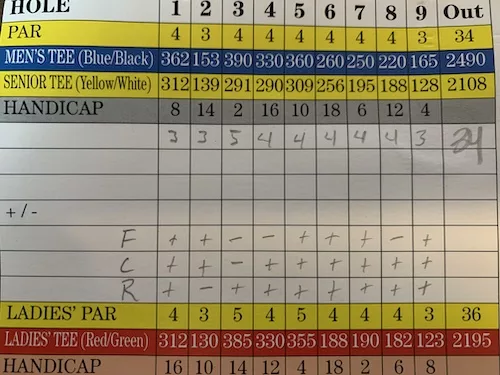A golf mental scorecard is a tool golfers use to record and track their thoughts and emotions on the golf course. I’ll take you through benefits of tallying your mental score and answer frequently asked questions about this mental game tool.
What is a mental scorecard?
A mental game scorecard can be a physical, tangible scorecard, or a digital application. Create a scorecard with enough space for sufficient detail of your thoughts and emotions.
If your recording system is simple enough, you could notate your work on a regular course scorecard without anyone noticing.
Amazon also sells inexpensive golf journals suitable for recordkeeping.
What do I include on my mental scorecard?
Track your thoughts and emotions while playing. As you play each hole, take note of your thoughts and emotions. You may use a rating system to track how you’re feeling.
Rate your confidence, your emotional response, and your focus. You can be specific with a number system ratings such as 1-10 or use a simple plus-minus/positive-negative assessment.
- F – Focus
- C – Confidence
- R – Response

Benefits of Using a Mental Game Scorecard
Using a mental scorecard helps golfers stay focused and maintain a positive mental attitude. Being objective about your performance minimizes external distractions such as the weather, other players, and even negative self-talk. When consciously tracking their thoughts and emotions on the course, golfers may identify patterns and behaviors holding them back and work to address them.
A mental scorecard can also help golfers stay in the present moment and stay on the task at hand–the next shot. Golf is a game that requires mental discipline and the ability to stay focused for long periods of time.
By tracking thoughts and emotions, the player remains aware of their themselves. Staying positive with a good attitude even when shots are not executed as desired.
Here are 5 tips on how to maintain positive golf thoughts.
To be sure, golf can be a frustrating game, and it’s easy to get discouraged by many things. By keeping track of thoughts and emotions, golfers can identify negative patterns and work to change them, helping them stay positive and motivated on the course. This non-judgmental assessment lets the golfer play without succumbing to self-critical thoughts. What a relief to just play!
What can my scorecard tell me?
Assess and identify your particular patterns and behaviors. After each round, review your ratings and look for patterns and behaviors that might be holding you back.
For example, you might notice you tend to get frustrated after missing a shot, or that you struggle to stay focused when the weather is hot. Identifying these mental challenges is the first step to resolving them.
Bettering your mental game
Consider the patterns and behaviors you’ve identified. The mental scorecard is a tool to show areas where improvements can be made. The next step is to take that information and improve your mental game.
This might involve practicing visualization techniques to stay focused or working with a performance coach or mental performance specialist to address negative thought patterns.
Visualization in your golf routine
Visualization is a mental training technique that involves creating a mental image or simulation of a desired outcome or performance.
Used by elite athletes to improve their physical performance, visualization helps the athlete develop a clear and specific mental representation of what they want to achieve. And you can easily add this technique to your pre shot routine for a great benefit. Read tips about the pre-shot routine here.
By visualizing the desired outcome or performance, you better focus and stay on track; perform with more confidence and precision; stay motivated by seeing and feeling the success you are working towards; and manage anxiety by feeling more prepared and confident in your ability to perform.
Check out my article for specific information on visualization and meditation for golfers.
Mental Scorecard FAQs
Final Thoughts
The golf mental scorecard is a valuable tool for golfers looking to improve their mental game and stay focused on the course. It helps players stay positive and motivated, stay in the present moment, and identify patterns and behaviors that might be holding them back. By using a mental scorecard regularly and making changes based on the assessment, you can improve your mental discipline and focus and ultimately, your golf game.
